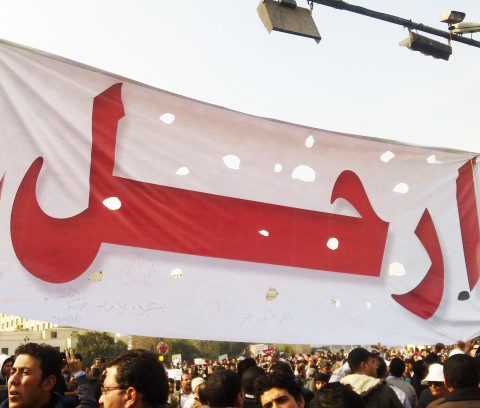
Protesters in Egypt hold a sign that reads “Leave!” in Arabic. Photo from Wikimedia Commons.
In the face of the recent uprising, the future of the Middle East has been the center of agitated discussions in Harris, classrooms, hallways and even in bed. But the more I heard people brilliantly defending their own theories, the more I felt the urge to say that I thought we were missing the forest for the trees, as the cliché goes. When I heard those talking about the importance of freedom in the Middle East, there was something cynical about it.
One of the first things that struck everybody (as always) was the role of the United States in the recent events. Most people looked at it from a political perspective and called it a diplomatic challenge. But certainly most people ignored the fact that Egypt’s and other states’ failures were deeply rooted in the neoliberal markets sponsored by the United States.
In a recent article on Al Jazeera’s English-language web site, Dr. Walter Armbrust of Oxford University said, “The reality of Egypt’s political economy during the Mubarak era was very different than the rhetoric, as was the case in every other neoliberal state from Chile to Indonesia.”
The utopia preached by western capitalism is extremely unsuccessful in the wrongly-labeled “developing” nations. The formula, owned by those few successful corporations and institutions—such as the infamous International Monetary Fund—enables the absurd disproportion between the rich and the poor, giving way for the elites to protect and maintain their ideals through controlling the economy at their own will.
Middle Eastern uprisings have not been solely against autocratic governments. They essentially disapprove of the neoliberal market and all its implications. Here lies one of the major values of these attempts of revolutions: they are the first to happen in a contemporary neoliberal economy. Armbrust clearly points out that “the complete failure of neoliberalism to deliver ‘human well-being’ to a large majority of Egyptians was one of the prime causes of the revolution.”
But democracy does not promise any better; in fact, most democratic policies facilitate the existence and strength of neoliberal markets, and therefore the naturalization of social injustice. As Lev Grinberg, professor at the Ben-Gurion University of the Negev, said, “Democracy does not necessarily solve problems related to poverty and economic inequality, nor does it resolve cultural conflicts related to the common identity of the nation’s citizens.” This is especially true for this country, the “land of the free.”
Dick Cheney and Donald Rumsfeld, members of the former Bush administration, amassed their fortunes by skillfully blurring the line between their businesses and their political position. Democratic laws enable the public state to be dangerously tied to the private sector.
Shouldn’t we be telling Middle Easterners that democracy might not be the smartest way out? Our responsibility as benefactors from a seemingly successful system based in tremendous global inequality should be to warn those about to step on the quicksand of democratic neoliberalism.
Democracy is not the fairy tale most believe it is, and we should certainly be telling this story, not just to the world, but to ourselves.
We all know that capitalist corporations have undermined our so-called “democratic liberties,” and that social justice seems a far goal. We are also highly aware of our generational hypocrisy, but at the same time we are overwhelmingly conscious of our generational responsibility. The Middle East is telling the world that people have the right to hold their governments accountable for injustices.
We are the citizens of a world no longer polarized by a Cold War. Our classrooms are full of messages of social justice, full of awareness of the fallacies of capitalism. It seems to me that most people are afraid to see beyond the uprisings in the Middle East and turn their glance inward. But we should not be afraid. To question the principles of this country is not necessarily to be a Marxist.
We embody the potential of structural change, so what are we going to do now? Perhaps organize a boycott to the major financial conglomerates? Or back up those protesters in Wisconsin who are fighting against the government’s attempt to abolish their right for collective bargaining?
It is not for me to say. But surely, as Armbrust said, “[T]he application of utopian neoliberalism in the real world leads to deformed societies as surely as the application of utopian communism did.”
I might be a hopeless socialist, but we should not be hopeless idealists. In realizing the absurd inequality of our current system, we may trigger our own hidden activism. •










“No one pretends that democracy is perfect or all-wise. Indeed, it has been said that democracy is the worst form of government except all those other forms that have been tried from time to time.”
— Winston Churchill, 1947
I beg to differ, crony capitalism and capitalism arnt the same thing as the left portrays.
What exists now is crony capitalism, blame that, the only place true capitalism exists today is the underground economy.
And since its apparent none of you goes with weed anymore that itself should show you how effective true capitalism is at surviving even when your murderous crony capitalist governments oppose it.